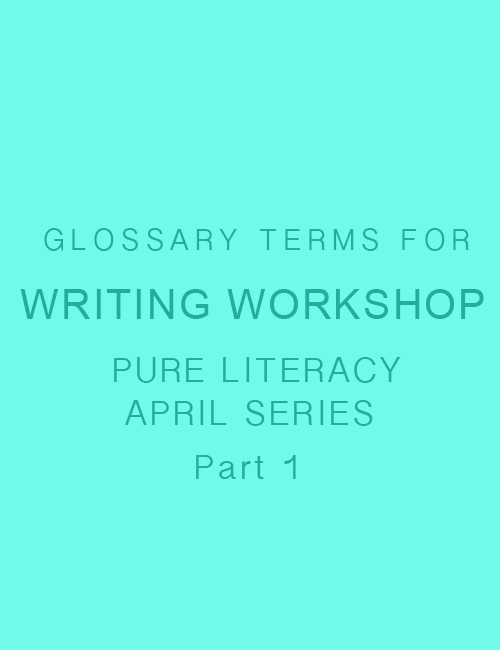Happy Sunday everyone!
After receiving some fabulous feedback on my blog post The Top 12 Glossary Terms for Literacy Models as well as some more in-depth questions on the topic I've decided to run a Writing Workshop Glossary Terms Series for Teacher Tips in April! So, every Sunday for the month of April, I'll have a new post in the series expanding on the last. I'll be discussing terms and touching on topics such as essential features of Writing Workshop, instructional strategies, mini lessons and more!
Over the years, as a coach and consultant working with teachers in implementing Writing Workshop, more often than not the same predictable questions come up. And usually these questions were associated with confusion around the instructional strategies used in a Workshop Model. While I have taught writing at many grade levels supported by the Writing Units of Study for decades, these predictable questions got me thinking… Those of us who teach Writing Workshop have our own way of talking about writing instruction. And… to those of us who teach Writing Workshop it makes perfect sense, but to someone new to Writing Workshop these terms can be a little overwhelming. Recently, my work in schools has been to support teachers in implementing the new Writing Units of Study. One thing many of many of these teachers have in common, no matter the grade level, is tangles with terms.
If you are being asked to teach in a Writing Workshop model it helps to know the lingo. So this first post is all about describing some of the essential features of Writing Workshop. Let’s start with some of the common instructional strategies used in the hour or so of Writing Workshop.
Spoiler alert- these are not official “researched-based” definitions nor did they come from some literacy search engine data base. And honestly, there are probably others who may use these words entirely differently. But these are the words I find myself using frequently during Workshop instruction based on my own experience as a teacher, coach, consultant, staff developer and author.
Writing Workshop Features
Mini Lesson
What: Brief (10 minutes or less) targeted lesson where you teach a specific procedure, skill or strategy that student writers can use in their own writing not just today-but every day.
Why: This whole group practice provides the foundation and preparation for transference and application to independent writing.
Methods: We may teach by demonstrating (modeling how and when writers use this strategy or concept in their work rather than simply telling what writers do); explaining and showing an example; involving the class in a shared inquiry; or taking them through guided practice.
Conferring
What: Teacher listens and questions during individual conferences to help students look at their own writing with a critical eye. Conferences occur during independent writing time in Writing Workshop and can take place at any stage in the writing process.
Why: Individual conferences with students give teachers a chance to differentiate instruction by zeroing in on what each student needs as a writer.
Mid Workshop Share
What: Mid Workshop Share is a teacher controlled interruption to refocus writers, remind students to apply the mini lesson’s strategy or skill, or spotlight the work on one student or a partnership.
Why: Teacher controlled opportunity to refocus writers.
End of Workshop Share
What: End of workshop share is a teacher controlled opportunity to recap and spotlight the work on one student or a partnership that applied a strategy that was the teaching point focus of the mini lesson that day.
Why: Share time recaps the teaching point, encourages ways for children to reflect on aspects of their writing, and provides a transition into whatever you’ll teach next.
So there you have it, our first in the series for April! I hope as this series continues I help to untangle some Writing Workshop terms and provide you with a little Writing Workshop lingo go-to.
Now, I’d love to know your thoughts and/or what literacy lingo have you wondered about? Share in the comment section here or write in at the Ask Anything section in the sidebar, don’t be shy! Tune in next week for answers to your questions and the next part in the Writing Workshop Glossary Terms Series!!!
See you next week!

